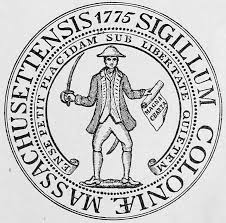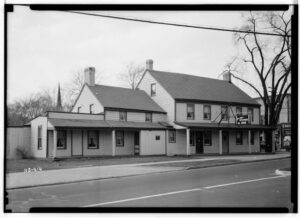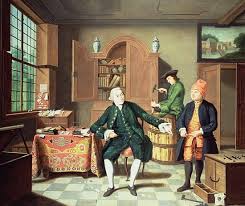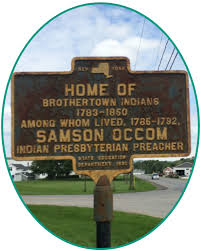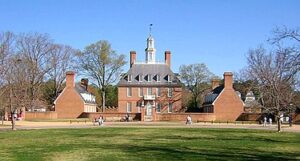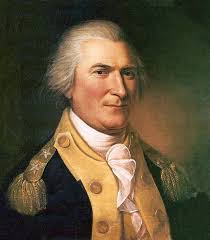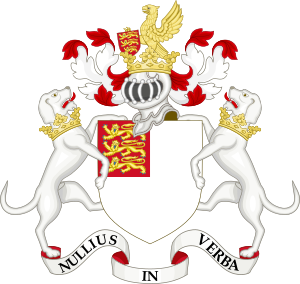Americanism Redux
December 5, your today, on the journey to the American Founding, 250 years ago, in 1774
If you’d told me last year at this time that you, me, and all of us would be where we are now…
…I never would have believed you…
…nope, never would have believed it.
* * * * * * *
(the logo they will adopt)
It’s never happened this way before in the colony of Massachusetts. Or any other British colony, for that matter. Never happened…until now, this week.
An alternative governing legislature has sprung up, created by colonial rights supporters. A rival to the government embodied by imperial governor General Thomas Gage, his Redcoats, and a smattering of loyal councilors, this new “Provincial Assembly” has been making basic governmental decisions, policies, and pronouncements through ninety anti-imperial, elected Representatives for the past few weeks. But yesterday, they did something even more memorable. They said “thank you” to the Continental Congress recently adjourned in Philadelphia. And what a thank-you it was.
Stop for a second and breathe in the significance of this—these Representatives, with John Hancock chosen as “Speaker”, who were not recognized or accepted by British imperial authority in the colony, expressed gratitude to the unprecedented Continental Congress, a body whose very multi-colonial nature places it in stature and influence either morally equal to or slightly above the also unprecedented Massachusetts Provincial Congress.
The Representatives went on from there. They endorsed the work of the Continental Congress as well. The Representatives embraced the new economic boycott, or the “Association” as it’s now known in the colonies. They called for the colony’s “districts and towns” to select “Committees of Inspection” responsible for monitoring the maddeningly complex task of cutting trade between the colony and England. They also voted to send back the same five Massachusetts delegates to the next Continental Congress slated to meet in six months. To them will be given the latitude to decide and act as circumstances may require at that future time.
The Representatives described the work of the Congress in Philadelphia as “founded on the immutable Laws of Nature and Reason, the Principles of the English Constitution, and respective Charters and Constitutions of the Colonies.” This statement drives a stake into the ground. Here we stand, next to the stake, hammer in hand.
From there, they point to this goal: “Recovery and Establishment of American Rights and Liberties, and…restoring Harmony between Great-Britain and the Colonies.”
You can see a dim outline in the distant mist—an assemblage of a colony linking outward to an assemblage of all colonies.
And it started with saying thank-you.
* * * * * * *
(The Recompense Stansbury Inn)
It’s getting-down-to-business time in the colony of New Jersey, as is true elsewhere in the British colonies.
Recompence Stansbury (great name!) is one of thirty-two people on the Association enforcement committee now operating in the county of Essex in New Jersey. He begins the intricate work of translating the boycott resistance-policy into daily practice and routine. One of the many headaches with which Stansbury will struggle is how to know the actual import arrival-dates of items offered for sale. How to tell which is new and in violation and which is old and allowable?
Daily, weekly, monthly, Stansbury knows he’ll need to meet personally with employers and encourage people to report on suspected boycott violators. Strangers, friends, family, network connections, the well-known and the un-known, they’ll all be targets for his work. He’ll be checking the contents of boxes, bags, barrels, and crates. He’ll be scrutinizing dates, names, and places scribbled onto contracts and bills of sale. He’ll have to judge forgeries and false statements. It’s delicate and potentially explosive.
All of his work will be in a climate of boiling hostility and tensions. This truth is evidenced by the fact that two anti-colonial rights essays printed and sold to readers are now being rounded up and seized for public burning.
The lines between enforcement, punishment, vengeance, and violence are easily blurred.
* * * * * * *
(a new headache in doing business)
Up and down the Atlantic Coast, there are hundreds of people in the same situation as Recompense Stansbury.
They live in a town or county where a group has assembled and claimed a pro-colonial/anti-imperial authority. Using this authority, the group declares its acceptance and approval of the Association, the boycott produced as a counter-measure by the Continental Congress. Sometimes they add flowery language to the pronouncement, sometimes they don’t.
Regardless, these groups now name usually twenty to thirty people—it varies epending on the location—who will be responsible for executing the boycott, for putting teeth to the words.
While conducting whatever their ordinary business is, they walk the streets, watch daily life, and intervene as they choose:
–open your box, your bag, your crate, your barrel and let me see inside to make sure the contents aren’t in violation of the boycott.
–hand me your contract or bill of sale and I’ll check the dates, signatures, and locales are in order; and is the writing valid or a forgery?
–have you heard anything about the merchant or vendor across the street?
–have you seen anyone trying to buy banned goods or do banned things?
–have you met anyone who talks, reads, or writes in opposition to the boycott or colonial rights?
It’s the new normal…and you never would have believed it a year ago.
* * * * * * *
(Sally Cary Fairfax)
George Washington is back at Mount Vernon. He walks into his study that he loves so much, the front parlor for formal entertaining, the little parlor for private relaxation, the dining room with the green-painted walls to aid digestion.
He thinks back to a few hours earlier.
It was then that he was at a neighboring plantation that has been such a large part of his life on the Potomac River. Belvoir, they call it, first owned by the Fairfax family, many of whom George has known since childhood. One of the Fairfaxes—Sally Fairfax, wife of one of George’s best friends, also called George—was the first love of his life almost twenty years ago. Despite being married, Sally had flirted with George, and he with her, clumsily and awkwardly, of course, as was his way. Their mutual flirtation had drifted into genuine caring and deep affection, arriving on the border of commitment and sorrow, gazing at lives they could not lead together, dividing into different worlds of he and wife home in Virginia and she and husband gone to England.
The current renter of Belvoir held an auction earlier today. George Washington attended it by himself. He wandered through the home as buyers snapped up desks, chairs, sofas, cups, plates, and more. With many of the items Washington saw something invisible to the buyers. He saw memories of Sally, her hands and hair, her touch and voice, her glances and smiles.
Tonight, back at Mount Vernon, George sleeps in the private bedroom he shares with Martha, made purposely in a separate part of the house. He waits for her return to the place and the life they’ve built together.
* * * * * * *
(Brothertown)
A family tries to heal old wounds with a generous friend, mentor, and sponsor, someone they’ve relied on for monetary support and financial stability.
Joseph Johnson is a member of the Mohegan Native tribe. He is a convert to Christianity and a Christian evangelist among other Native tribes and people. He apologizes to Reverend Eleazar Wheelock, president of Dartmouth College and the patron of the Johnson family. Johnson regrets his harsh actions and words toward Wheelock and confesses that he is a “despicable lump of polluted clay…in his tawny skin”. Johnson implores Wheelock to remember how much his family needs money to continue evangelizing. He also reminds Wheelock that many Native families are following the Johnsons to a new settlement in central New York, called Brothertown.
Johnson hopes a full and open admission of his guilt will repair the relationship with Wheelock. His is a different approach from the one taken by those colonists now clashing with British imperial power. Maybe some things cannot be transferred from the family level to the community level.
* * * * * * *
(where they’re cheering Dunmore)
Hello there, faculty and leadership of the College of William and Mary! Yes, thank you, thank you. I appreciate your kindnesses. Thank you very much. Nice to see you and nice to be back. Your congratulations mean much to me.
This is the reaction of Lord Dunmore, governor of Virginia. Both the college faculty and nearly everyone else with a pulse and beating heart in Williamsburg are showering him today with praise and applause upon his return from the upper Ohio River valley. His victorious military expedition against a coalition of Native tribes is wildly popular. Local people can’t wait to get their hands on lands prized by speculators and aspiring landowners. Well done, Governor, well done.
Dunmore is at the center of the best attention. Any of the latest imperial-colonial clashes and disputes are silenced in favor of these accolades.
Other governors in other colonies are despised, vilified, and ridiculed. They’re seen as public faces of abusive imperial power. Does Dunmore now have the ability and stock of public goodwill to avoid this fate? Can he outlast the trend of hostility toward the colonial official most identified with British rule and policies? How does a leader convert popularity from one action into persuasion used in other actions?
What’s the shelf-life of Dunmore’s moment?
* * * * * * *
(an older Arthur St. Clair)
Arthur St. Clair is at Ligonier, a small wooden fort on the very western fringes of the colony of Pennsylvania. He’s been witness to many of the actions taken by Dunmore and people under his authority in the upper Ohio River valley. While St. Clair generally accepts the outcome of the military side of the expedition, he worries that Dunmore will further strengthen his control over thousands of acres in the name of Virginia. St. Clair has seen that Dunmore is acting to establish a local court of justice answerable only to his authority rooted in Williamsburg. St. Clair expresses his concerns about Dunmore to John Penn, governor of the colony of Pennsylvania.
“After what has been done already,” he warns, ” ’tis hard to say what might not be attempted, and ’tis very certain that the people Dunmore has clothed with authority pay little regard to the rules of law or the dictates of reason.”
* * * * * * *
Look backward to measure, look forward to project, look within to know the difference.
Also
(the logo he loves)
These people are the life I love.
Benjamin Franklin is in London, England. He tends to one of his favorite groups and organizations, the Royal Society. Franklin relishes his membership in the Society. He savors the regular opportunity to meet with men of science and learning for discussion, debate, socializing, and networking.
Today, 250 years ago, Franklin introduces a new member to some of his friends in the club. He joins in the vote to re-elect the current Society President to another term.
The Royal Society speaks to the life that Franklin loves, the life of thought, of relationships, of shared curiosity about why the world is what it is, why the heavens are what they are, and why threads can be woven between the status quo and sustained improvement.
To Franklin, the Royal Society is a wonderful benefit of living in England.
* * * * * * *
Relationships make worth in a life. The nature of that worth can change over time, so much so that you might hear yourself saying, “I never would have believed it…”
For You Now
(six words)
The utterance of those six words—”I never would have believed it”—is the tip of the proverbial iceberg. They stand poking out of the water, barely visible, while beneath them is a set of experiences miles long, miles wide, miles deep. You know the truth of this.
You may not have thought, however, of a bigger element at work. What if the iceberg forms overnight? What then? To ask is to answer. It would be all the more shattering, all the more wrenching.
Imagine that you know Recompense Stansbury in New Jersey. You see him coming down the cobblestone street on a gray early December day. Would you think of him the same way that you might have a year ago?
Very unlikely.
The relationship between you and he has changed profoundly. It doesn’t matter which side of the imperial-colonial dispute you’re on, or if you’re trying to avoid it altogether. You’ll look at him differently as he gets closer and closer to you.
He’s not the same Stansbury. He’s a new Recompense.
Suggestion
Take a moment to consider: are you now seeing changes in your relationships?
(Your River)

